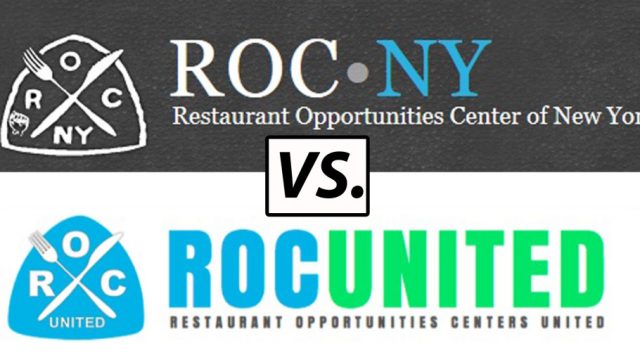Workers’ centers civil war spills into the open

By Eric Boehm | Watchdog.org
MINNEAPOLIS — Workers centers have made a name for themselves by declaring war against corporations, which, they say, are paying less than a living wage.
But a behind-the-scenes battle between two of the labor organizing groups is spilling into the open.
GETTING ROC’D: The Restaurant Opportunity Center of New York has been officially merged with ROC-United, its younger and bigger brother. Not all staff at ROC-NY were happy about it.
The Restaurant Opportunity Center United, or ROC-United, a national group pushing for a $15 minimum wage and better working conditions for restaurant employees, announced Friday it was putting the finishing touches on a merger with the Restaurant Opportunity Center of New York, or ROC-NY.
Apparently, that merger did not sit well with members of ROC-NY. A message posted to the ROC-NY website Thursday aired some dirty laundry by suggesting the terms of the takeover might have violated New York state law and declared that ROC-NY would remain an independent organization.
It’s confusing, yes.
Here’s the important background: ROC-NY was one of the nation’s first so-called “workers centers,” a nonprofit founded after 9/11 to help restaurant workers in the twin towers and elsewhere in lower Manhattan displaced by the attack. The organization grew into a voice for higher wages and better working conditions for all New York restaurant workers and attracted the support of organized labor unions.
With the backing of those unions, similar organizations were launched in other cities under the national umbrella group called ROC-United.
It’s important to note that ROC-United and ROC-NY remain legally separate.
From the message posted Thursday, it seems ROC-NY was getting pushed around by its younger-but-now-bigger brothers at ROC-United.
“We tried to reach a reasonable and mutually beneficial agreement with ROC-United,” said members of ROC-NY in the online statement. “But ROC-United demanded that we sign an agreement that would have required us to violate NY State laws, and when we declined to sign, ROC-United shut down communications and severed ties with us.”
Maria Myotte, national communications director for ROC-United, said in a statement the “unification process” brought ROC-NY staff and members into ROC-United and was successfully completed.
“A few New York staff members decided not to join the merger,” Myotte said. “We have told them that if they wish to continue their work, they will have to form their own new organization which will not be affiliated with ROC.”
Watchdog.org’s calls to both organizations went unreturned.
AT THE CENTER OF THE STORM: Saru Jayaraman, co-founder of ROC-NY and now the national head of ROC-United, is leading the push to centralize the worker centers’ operations.
At the heart of the fight between ROC-United and ROC-NY, according to Paul’s sources, is an effort by the national organization to centralize the operations of the local groups within it. One former staffer wrote in an email that she and several others were fired for opposing this centralization.
For an added twist, the head of ROC-United now pushing the national unification is Saru Jayaraman. She was a founding member of ROC-NY before moving over to the national organization a few years ago.
Paul writes that Jayaraman is “a refreshing addition for a movement that is in desperate need of positive change.”
“But starting about a year ago, insiders say, Jayaraman didn’t want to lose control. Instead of converting the national organization into a confederation of locals, she raised philanthropic funds to hire a larger staff that dictates policies and procedures to the locals,” he adds.
Make no mistake about it, Jayaraman is a powerful voice within the increasingly-powerful workers center movement. Richard Trumka, president of the AFL-CIO, has praised her work with ROC.
Myotte, of ROC-United, said the centralization creates a united front and puts the organization in a stronger position.
Mike Paranzino, spokesman for ROC Exposed, a group funded by the restaurant industry and others who oppose ROC-United’s and ROC-NY’s agendas, said the sudden move to centralize operations at the national level flies in the face of the groups’ grassroots organizing message.
“For years, ROC had been preparing to make its local chapters separate entities to advance its local-based narrative and allow local workers to have a voice in the organization,” Paranzino said Monday. “Of course, those who have studied ROC have seen this before — when the interests of workers diverge from the interests of ROC’s leadership, ROC’s leadership does not hesitate to trample the workers.”
Indeed, this is not the first time that ROC-NY and ROC-United were in conflict.
At the time the grant was given, ROC-United was not yet officially recognized by the IRS as a charitable nonprofit because the federal government raised questions about whether the organization would be more accurately characterized as a labor union, for fairly obvious reasons. Later, ROC-United was given nonprofit status by the IRS.
Boehm can be reached at EBoehm@Watchdog.org and follow @EricBoehm87 and @WatchdogOrg on Twitter for more..







